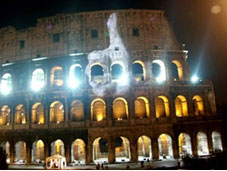 The Community of Sant'Egidio and the initiative "Cities for Life The Community of Sant'Egidio and the initiative "Cities for Life
 The approval in the last two years of two Resolutions for a universal moratorium on capital punishment at the General Assembly of the United Nations confirm a change in the feelings of the world that may lead to a new and higher threshold in the respect for human rights. The approval in the last two years of two Resolutions for a universal moratorium on capital punishment at the General Assembly of the United Nations confirm a change in the feelings of the world that may lead to a new and higher threshold in the respect for human rights.
Even the Human Rights Commission of the African Union adopted, at the beginning of last December, a resolution that calls on States in Africa to observe a moratorium on the death penalty, sending a clear signal that the international community would vigorously support the UN vote for the moratorium.
Capital punishment is a relic of the past as it has been for slavery and torture, that were eventually rejected by the conscience of the world. However, the road towards the abolition of capital punishment remains long and difficult and it requires decisive and long term actions in view of the implementation of the resolution and of the ultimate, and universal abolition of death penalty.
Thus, the World Day of Cities for Life/Cities Against the Death Penalty,-which is celebrated every 30th of November, commemorating the anniversary of the first abolition of the death penalty by one European state, the Grand Duchy of Tuscany, in the year 1786 - is an important initiative. It has gathered over the years many local governments and civil societies, to offer and promote universally this decisive battle for the whole of humanity. The latest edition, that of 2008, registered the participation of nearly a thousand cities, including 55 capitals, making it the largest international mobilization undertaken so far to halt all executions in the world.
The eighth edition of the event is underway and it will be celebrated on November 30th , 2009. Many cities are already providing cultural activities and public awareness events supported and organized in synergy with the Community of Sant'Egidio and its related associations in Italy and other countries.
 The firts edition of the event was held in 2002 The firts edition of the event was held in 2002
With the initiative we asks each city a sign that might be visible to the citizens and to the world. This gesture, preferably the illumination of a significant monument of the city, is often accompanied by a vote of the City Council to adhere to the universal moratorium and by concrete commitment to raise the awareness of the civil society on the theme. About 80 cities have participated in the first edition in 2002. Today there are nearly a thousand, including 55 capital cities on five continents. Cities also participate with educational initiatives. The most significant places in the cities are normally involved in the celebration of the evnt: Rome has chosen the Coliseum, Brussels the Atomium, while Barcelona, just to quote some of the many is lighting Cathedral Square.
|

